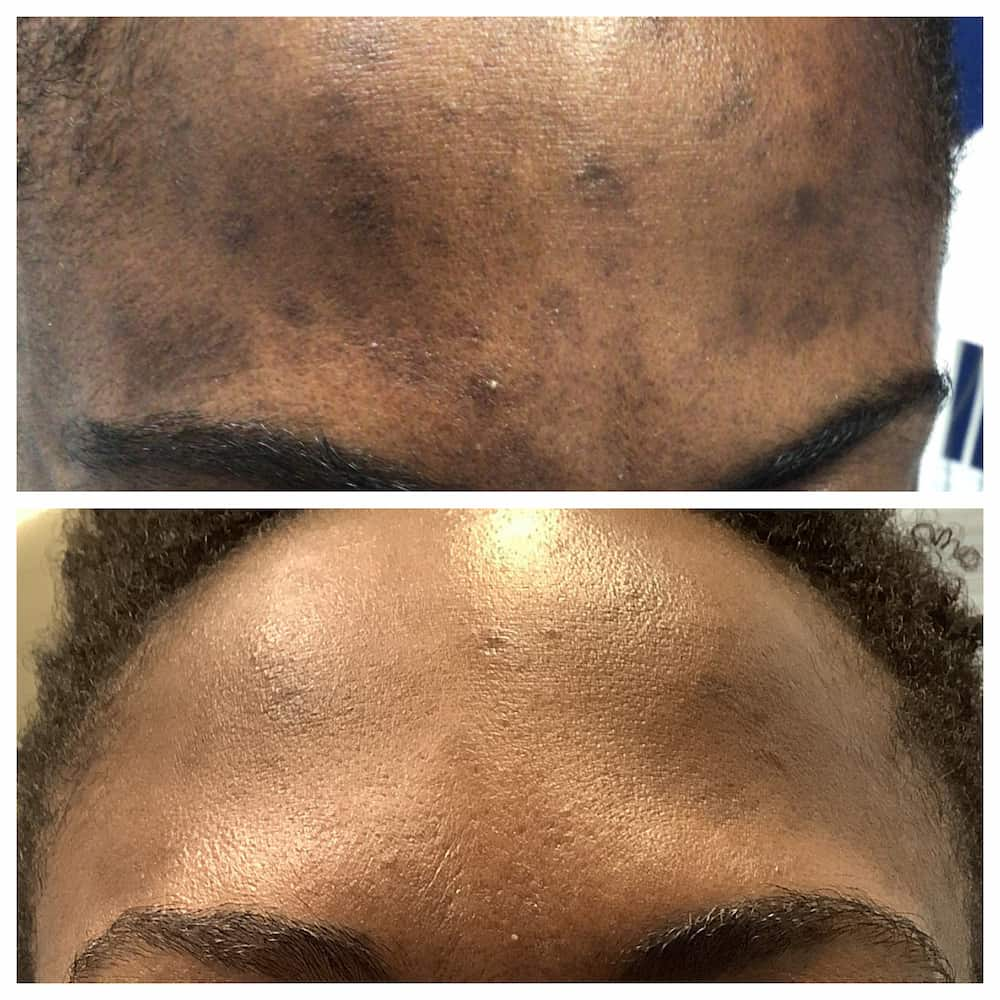Hyperpigmentation
Hyperpigmentation refers to darkened areas of the skin caused by an overproduction of melanin. Schedule a consultation today.

What is Hyperpigmentation?
Hyperpigmentation refers to darkened areas of the skin caused by an overproduction of melanin, the pigment responsible for skin color. It can appear on any body part and affect people of all skin tones, although the severity and visibility may vary.
Common Types of Hyperpigmentation
- Melasma
- Often called the “mask of pregnancy,” melasma is associated with hormonal changes, particularly in pregnant women or those on hormonal contraceptives. It appears symmetrical, with blotchy facial patches, especially the forehead, cheeks, and upper lip.
- Post-Inflammatory Hyperpigmentation (PIH)
- Sunspots (Solar Lentigines)
- These are flat, brown spots that develop on areas exposed to the sun, such as the face, hands, shoulders, and arms. Sunspots are most common in older adults due to cumulative sun damage.
- Freckles (Ephelides)
- Freckles are small brown spots that can become darker with sun exposure. While largely genetic, they are a form of pigmentation intensified by UV radiation.
Causes of Hyperpigmentation
Hyperpigmentation can be triggered by several factors, including:
- Sun Exposure: UV rays stimulate melanin production, often leading to dark spots.
- Hormonal Changes: Hormones can influence melanin production, particularly during pregnancy or menopause.
- Skin Injuries: Scars from acne, cuts, or burns may leave darker spots behind.
- Certain Medications: Drugs like chemotherapy agents, antibiotics, and anti-seizure medications can cause hyperpigmentation as a side effect.
- Medical Conditions: Addison’s disease, a rare adrenal disorder, and other systemic conditions may cause skin darkening.
Prevention Tips
While hyperpigmentation is not always preventable, these measures can minimize its occurrence:
- Daily Sunscreen Use: Apply broad-spectrum SPF 30 or higher every day to protect your skin from UV damage.
- Avoid Picking at Skin: Scratching acne, wounds, or bug bites increases the risk of PIH.
- Maintain a Skincare Routine: Incorporate products with antioxidants and ingredients like vitamin C to support even skin tone.
- Limit Sun Exposure: Wear hats, sunglasses, and protective clothing outdoors.
Treatment Options at St. Louis Dermatology & Cosmetic Surgery
At our clinic, we offer personalized hyperpigmentation treatment plans using state-of-the-art techniques:
- Topical Treatments
- Hydroquinone: A gold-standard depigmenting agent that lightens dark patches.
- Retinoids: Promote cell turnover and fade discoloration over time.
- Vitamin C Serums: Antioxidants that brighten skin and neutralize free radicals.
- Chemical Peels
- Chemical peels exfoliate the top layers of skin, revealing a brighter, more even complexion. We offer tailored peels, such as glycolic, salicylic, and trichloroacetic acid peels, based on your skin type.
- Laser Therapy
- Advanced laser treatments, such as fractional lasers, precisely target melanin deposits. Our clinic specializes in laser solutions for all skin tones, minimizing the risk of adverse effects.
- Microneedling
- By stimulating collagen production, microneedling reduces hyperpigmentation and promotes overall skin rejuvenation.
- Advanced Skincare
- Our dermatologists curate medical-grade skincare regimens featuring products like kojic acid, azelaic acid, and arbutin to manage pigmentation effectively.
Why Choose St. Louis Dermatology & Cosmetic Surgery?
- Expertise Across Skin Types:
- Our specialists are trained to treat hyperpigmentation in all skin tones, ensuring safe and effective outcomes for diverse patients.
- Cutting-Edge Technology:
- We utilize the latest tools and methods, from FDA-approved treatments to personalized skincare recommendations.
- Holistic Approach:
- We combine medical expertise with cosmetic artistry, focusing on the patient’s overall well-being and aesthetic goals.
Frequently Asked Questions
How long does it take to see results?
Is hyperpigmentation permanent?
Are treatments painful?
Can men develop hyperpigmentation?
Schedule Your Consultation Today
St. Louis Dermatology & Cosmetic Surgery is committed to helping you achieve clear, radiant skin. If you’re dealing with hyperpigmentation, don’t hesitate to reach out. Schedule a consultation today to explore your personalized treatment options and take the first step toward a more confident you.
GET IN TOUCH

